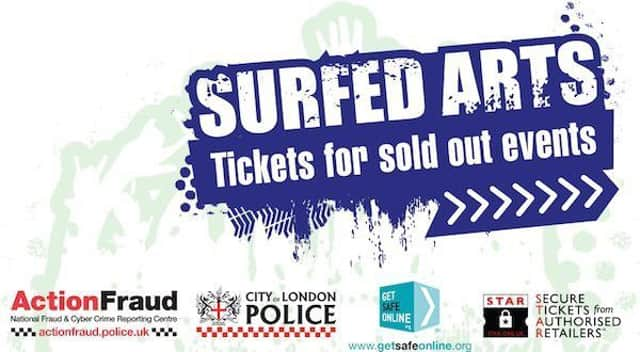Hoax ticket website set up to '˜scam' fans and bring fraud into the spotlight


With moves in place to clamp down on ‘legal’ secondary event ticketing, attention has turned to fraudulent event ticket sales, which have claimed more than 21,000 victims in the past three years.
More than £17 million has been reported to be lost to ticket fraudsters over that period, with victims most likely to be men in their twenties.
Advertisement
Hide AdAdvertisement
Hide AdAction Fraud - the UK’s national reporting centre for fraud and cybercrime - set up a fake music ticket website, ‘Surfed Arts’.
Surfed Arts was designed to look like a secondary ticket provider, imitating the way fraudsters offer fake tickets online. It used Facebook adverts to target people living in areas where bands or artists are due to play sell-out concerts.
Adverts were shown to fans of Adele in London, Ed Sheeran in Manchester, Iron Maiden in Birmingham, Coldplay in Cardiff and Bruno Mars in Leeds.
Fans who clicked through were taken to the Surfed Arts website where they were immediately told that they were not able to buy tickets and advised on how to protect themselves from falling victim to real ticket fraudsters in the future.
Ticket fraud victims online
Advertisement
Hide AdAdvertisement
Hide AdA recent report has shown that people are increasingly using other secondary tickets sources such as social media in order to purchase tickets.
In the last three years more than 21,000 people have reported falling victim to ticket fraudsters and the majority of these reports concern the secondary ticket market and sources such as social media or independent ticket websites.
Recent legislation introduced will prevent the use of ‘bots’ buying tickets to re-sell at inflated prices, but the threat of bogus ticket outlets remains.
Sites like Surfed Arts don’t have any tickets to sell in the first place; buyers pay for what looks like tickets to concerts, festivals or sporting events only for the seller to disappear with the victim’s money or send them counterfeited tickets that aren’t valid for entry.
Advertisement
Hide AdAdvertisement
Hide AdThe most common victim to report to Action Fraud is a man in his twenties.
Bank transfers were the most commonly used method to buy tickets with 64.6 per cent of people saying that it was the payment method used when they were defrauded.
Of those reporting, more than 33 per cent said that the fraud had a significant effect on their life and an additional 7.8 per cent said that being defrauded in this way had severely affected them.
Action Fraud are advising anyone who doubts the legitimacy of a ticketing website to check the ticket seller’s registered with www.star.org.uk and get more advice from Get Safe Online